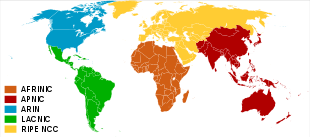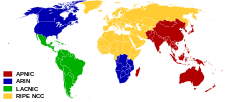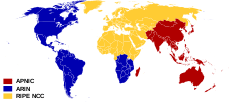Regional Internet registry
A regional Internet registry (RIR) is an organization that manages the allocation and registration of Internet number resources within a region of the world. Internet number resources include IP addresses and autonomous system (AS) numbers.

.png) | |
| Founded | 1992 (RIPE NCC) 1993 (APNIC) 1997 (ARIN) 1999 (LACNIC) 2003 (NRO) 2004 (AFRINIC) |
|---|---|
| Type | Internet governance |
| Focus | providing a coordinated Internet number registry system supporting the multi-stakeholder model |
| Origins | 1992 RIPE NCC begins distributing addresses 2003 letter from RIRs to ICANN 2004 Memorandum of Understanding |
Area served | Earth |
| Method | coordinating joint activities of regional internet registries |
| Internet |
|---|
 An Opte Project visualization of routing paths through a portion of the Internet |
|
|
The regional Internet registry system evolved over time, eventually dividing the responsibility for management to a registry for each of five regions of the world. The regional Internet registries are informally liaised through the unincorporated Number Resource Organization (NRO), which is a coordinating body to act on matters of global importance.[1]
Five regional registries
The African Network Information Center (AFRINIC) serves Africa.[2] The American Registry for Internet Numbers (ARIN) serves Antarctica, Canada, parts of the Caribbean, and the United States.[3] The Asia-Pacific Network Information Centre (APNIC) serves East Asia, Oceania, South Asia, and Southeast Asia.[4] The Latin America and Caribbean Network Information Centre (LACNIC) serves most of the Caribbean and all of Latin America.[5] The Réseaux IP Européens Network Coordination Centre (RIPE NCC) serves Europe, Central Asia, Russia, and West Asia.[6]


Internet Assigned Numbers Authority
Regional Internet registries are components of the Internet Number Registry System, which is described in IETF RFC 7020.[7] The Internet Assigned Numbers Authority (IANA) delegates Internet resources to the RIRs who, in turn, follow their regional policies to delegate resources to their customers, which include Internet service providers and end-user organizations. Collectively, the RIRs participate in the Number Resource Organization (NRO),[8] formed as a body to represent their collective interests, undertake joint activities, and coordinate their activities globally. The NRO has entered into an agreement with ICANN for the establishment of the Address Supporting Organisation (ASO),[9] which undertakes coordination of global IP addressing policies within the ICANN framework.
Number Resource Organization
The Number Resource Organization (NRO) is an unincorporated organization uniting the five RIRs.[8] It came into existence on October 24, 2003, when the four existing RIRs entered into a memorandum of understanding (MoU) in order to undertake joint activities, including joint technical projects and policy coordination. The youngest RIR, AFRINIC, joined in April 2005.
The NRO's main objectives are to:
Local Internet registry
A local Internet registry (LIR) is an organization that has been allocated a block of IP addresses by a RIR, and that assigns most parts of this block to its own customers.[10] Most LIRs are Internet service providers, enterprises, or academic institutions. Membership in a regional Internet registry is required to become a LIR.
See also
References
- "About the NRO". Number Resource Organization.
- African Network Information Centre
- American Registry for Internet Numbers
- Asia-Pacific Network Information Centre
- Latin America and Caribbean Network Information Centre
- RIPE Network Coordination Centre
- R. Housley, J. Curran, G. Huston, D. Conrad (August 2013). The Internet Numbers Registry System. IETF. doi:10.17487/RFC7020. RFC 7020.CS1 maint: multiple names: authors list (link)
- Number Resource Organization
- The Address Supporting Organization
- "Number Resource Policy Manual". www.arin.net. Retrieved 2019-07-10.